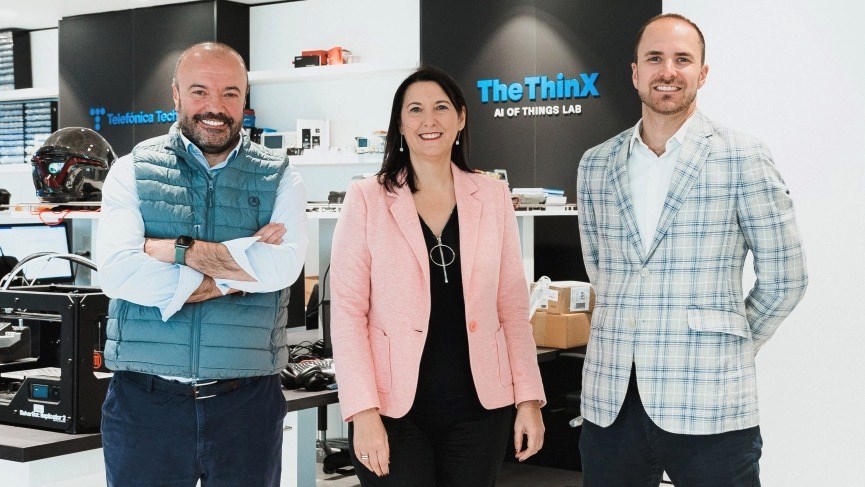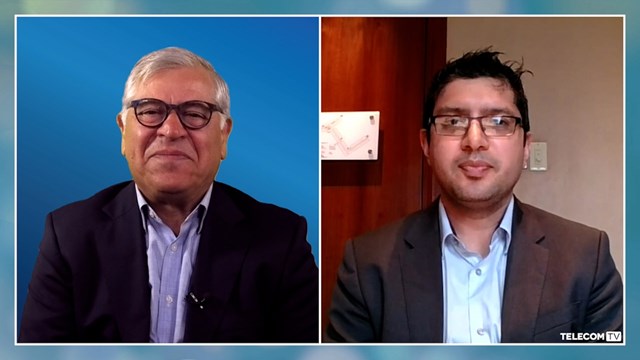
Left to right: Carlos Carazo, CTO of IoT and Big Data at Telefónica Tech; Elena Gil Lizasoain, global director of product and business operations for IoT and Big Data at Telefónica Tech; and Javier Miguélez, President of ARME.
- Telefónica Tech doubles down on robotics
- UK regulator Ofcom gets hacked
- Telecom Argentina joins techco club
In today’s industry news roundup: Telefónica Tech teams up with robotics specialist for tech hub development; UK regulator Ofcom falls foul of Russian hackers; Telecom Argentina joins the Open Gateway initiative as it cements its techco credentials; and more!
Telefónica Tech, the Iberian telco giant’s digital technology and services division, has teamed up with the Spanish Mobile Robotics Association (ARME) to create a technology hub “where companies from the technology and industrial sector can research, innovate and co-create solutions to boost the field of robotics.” The hub, located in The ThinX, Telefónica Tech’s IoT and big data applied technology laboratory, “will allow the business world to carry out robotic simulations in real conditions” prior to commercial deployment. “Both institutions will cooperate in the combination of technologies linked to communications, robots, navigation and localisation, and software. This range of technologies will be complemented by others related to cloud capabilities, edge computing, cybersecurity, artificial intelligence and blockchain,” noted Telefónica. “The creation of this mobile robotics hub will allow us to share knowledge and expand our capabilities in this field to develop the most innovative robotic solutions in demand in the market that help companies to digitally transform and gain in efficiency,” stated Elena Gil Lizasoain, global director of product and business operations for IoT and big data at Telefónica Tech. Javier Miguélez, president of ARME, added: “We see the creation of the international mobile robotics technology hub as a key step towards Spain’s leadership in the world of mobile robotics. The hub will generate more and better technological developments in our country. It will also attract foreign companies, promoting employment in a key sector for our future.” Read more.
Oh, the irony of it…. The UK comms regulator Ofcom has found itself the victim of a cyberattack. It seems private data relating to various companies that are actually subject to Ofcom regulatory oversight, such as the venerable national broadcaster the BBC, were hacked by the Russian ransomware gang that calls itself ‘Clop’. Among other UK companies affected by the hack are the pharmacy chain Boots, as well as British Airways, the accountancy and consultancy house Ernst & Young, and Transport for London, the big municipal body responsible for transport throughout the UK's capital city. The hackers found their way into these and other systems via a vulnerability in MOVEit software that actually exists to safeguard the secure transfer of sensitive files containing information such as employee bank account details. MOVEit is popular and is used by big commercial companies and other organisations all over the world. The personal information of 412 Ofcom staff was also stolen. In a statement, Ofcom said it acted “swiftly” to inform all the companies it regulates that the breach had happened and then referred itself to the UK’s Information Commissioner’s Office (ICO). According to Ofcom, “The issue has been fixed and the IT systems have been secured.” As soon as it became aware of the problem with MOVEit, Ofcom "immediately launched an investigation into our use of the tool and took urgent steps to safeguard any data. Our investigation is ongoing. We are manually and thoroughly investigating systems where data may have been accessed.” The Clop incursion was via a “supply-chain attack” on MOVEit’s transfer tool. Unfortunately, some of the corporate victims were compromised even though they themselves do not actually use MOVEit software – instead, data was accessed via an external third-party contractor. Clop has told its victims that, unless the gang is contacted by email within 24 hours, and ransom negotiations begin, it will start publishing their stolen data on the dark web. Commenting on the embarrassing breach, the CTO of NordVPN, Marijus Briedis said, “Stealing personal and company data from under the nose of the UK’s media regulator will be another feather in the cap of the cybercriminals behind the MOVEit hack.” Meanwhile, Ofcom remains red-faced.
Telecom Argentina is the latest telco to sign up to the GSMA’s Open Gateway initiative, which was launched in February this year with the backing of 25 leading network operators, including América Móvil, AT&T, China Mobile, Deutsche Telekom, Liberty Global, Orange, Swisscom, Telefónica, Telenor, Telstra, Telecom Italia (TIM), Verizon and Vodafone. The move is part of Telecom Argentina’s evolution towards becoming a techco, a move that is being adopted by multiple major operators and is already driving benefits for the likes of Vodafone, as we heard at this year’s DSP Leaders World Forum. “At Telecom [Argentina] we are evolving towards a techco, incorporating new 100% digital businesses with connectivity as a differential,” noted Roberto Nobile, CEO of Telecom Argentina, in this announcement. “Initiatives like this mark a milestone in the path of transformation of the industry, generating a world of business opportunities and a new standard of joint work with the rest of the players in the digital ecosystem,” he added. And it was also clear from this year’s DSP Leaders World Forum sessions that the Open Gateway initiative is playing an important role in enabling operators to make the most of their digital service provider assets, as Juan Carlos Garcia Lopez, SVP of technology innovation and ecosystem at Telefónica, explained – see The time is right for network API services, says Telefónica’s Garcia.
US telco giant Verizon is looking to hire a new CFO who could, ultimately, replace the operator’s current CEO Hans Vestberg, according to a Wall Street Journal report cited by Reuters. Current CFO Tony Skiadas was appointed earlier this year, as part of a broader management team shake-up, when Matt Ellis announced he was leaving the post for a new job elsewhere.
London Tech Week has uncorked a number of UK government technology announcements of some interest. Following Prime Minister Rishi Sunack’s latest push for AI stardom, the government issued an announcement that seemed more like a smorgasbord of disparate projects all lumped under the modest label of “bold plans” (they don’t live up to the promise…). Among the telecom medley is news of some OneWeb-enabled satellite broadband for remote residents in the Shetland Islands, some smart lamppost trials, and the signing of a “landmark memorandum of understanding between the UK and Australia” to “establish a roadmap between the two nations for future telecoms collaboration” revolving around “the development of open and interoperable solutions such as Open RAN” to help with “telecoms diversification” targets. Read more.
Ericsson says it has completed a cloud RAN-enabled call using Intel’s latest chipsets and integrated acceleration technology running on Hewlett Packard Enterprise servers. The trio deployed Ericsson’s cloud RAN software on Intel’s new 4th generation Xeon scalable processor, with the integrated virtualised RAN (vRAN) boost acceleration, based on HPE’s ProLiant DL110 server platform, which is optimised for virtual and Open RAN deployments. There’s no doubt that cloud RAN is on course to become the industry norm in time, as underlying chip and server technology meets the exacting requirements of commercial mobile operators, but Ericsson seems keen to position its work with Intel and HPE as a step forward for the Open RAN sector, which is a bit puzzling. “This achievement shows our commitment to driving Open RAN forward, with our high-performing Cloud RAN solution and extensive support of the larger ecosystem,” noted David Hammarwall, head of product area networks, at Ericsson in the company’s press release. “Working with partners like Intel and HPE, we are actively promoting open standards and delivering intelligent and sustainable solutions for future networks.” We’re checking with the vendor which Open RAN specifications Ericsson is supporting with its cloud RAN software.
Interesting news from a land down under, where the beer does flow and men chunder… The latest NBN (National Broadband Network) Wholesale Market Indicators Report from the Australian Competition and Consumer Commission (ACCC), shows that smaller Australian telcos are continuing to prosper and take market share from the Lucky Country’s big incumbent service providers, even as consumers churn away from relatively fast but determinedly expensive broadband internet access contracts in favour of slower but less costly alternatives. Transfer to, and uptake of, residential 25Mbit/s services grew by 125,000 premises in the quarter ending on 31 March and the total number of homes on that price tier is now more than 1.4 million, which equates to 16% of the NBN wholesale market. The faster, 50 Mbit/s tier remains popular with 52% market share, but numbers dropped by 99,000 services – that’s 2.1% – during the same quarter and now stand at just over 4.5 million. Meanwhile, uptake of the 250Mbit/s plans is growing steadily, having increased by 25,000 services during the March quarter and now accounting for in excess of 198,000 services, or 2%, of the NBN wholesale market. The shares of market leaders Telstra, TPG and Optus continue to fall, and dropped again, this time by 58,000 services collectively, or 0.9% that same quarter. The market shares of the big three wholesale access providers stand at 42.0% 22.0 % and 13.1% respectively and their decline in market share seems likely to continue. Simultaneously, smaller rivals continued to grow their market shares and now account for a combined 15.4% of the market. In the lead is Aussie Broadband, with Superloop and Southern Phone following. Commenting on the new report the commissioner of the ACCC, Anna Brakey, said, “There is flexibility for consumers to change plans, whether it be to save money or move to a speed tier that better suits their needs. The growing competition in the broadband market is good news for consumers as it encourages more choice and competitive pricing for internet services. We have seen sustained market growth quarter on quarter among the smaller broadband providers, reinforcing their presence in the market and the continued demand from consumers for alternative service offerings.” The report also shows that consumers are increasingly swapping their NBN service type from fibre to the node and fibre to the kerb to fibre to the premises (FTTP). The ACCC’s NBN Wholesale Market Indicators Report contains information on the NBN’s provision of wholesale services to retail service providers. It does not report on the services supplied by retail service providers to end users. Retail service providers use NBN’s wholesale access service to supply retail services to their own customers or, alternatively, to supply a wholesale service to another (and usually smaller) retail service provider. Most small retail service providers do not directly connect with them, instead reselling services that they buy from larger providers, such as Telstra, TPG and Optus.
- The staff, TelecomTV




